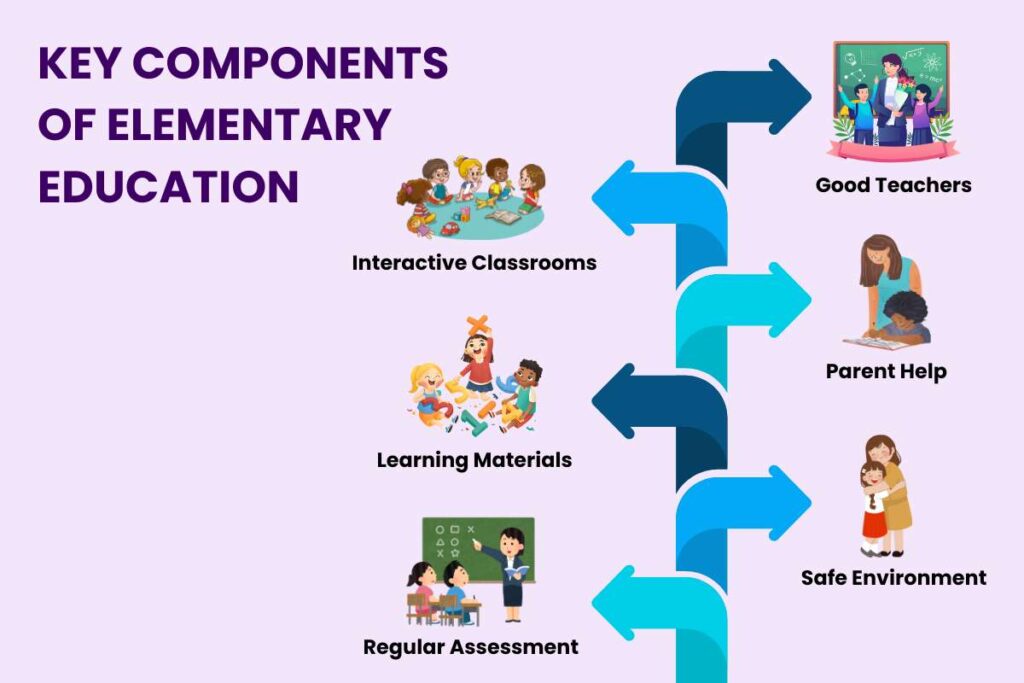When I think about my school days, elementary education comes to mind. It was the time I learned to read, write, and make friends. I remember my favorite teacher who made learning fun with stories and games. Those days in school helped me become more curious. The lessons I learned still guide me today. Elementary education was the beginning of my learning journey, and it gave me a strong base for everything. In this article, we will learn about what Elementary Education is and why it is important.
What is Elementary Education?
Elementary education is the first step in a child’s school life. It starts at the age of 5 or 6 and goes up to age 11 or 12. In this stage, children learn basic skills like reading, writing, and math. They also study science, social studies, art, and physical education. It builds the base for future learning. Kids are curious at this age. Teachers use fun ways like stories, games, and group work to help them learn. They also teach kids how to think, ask questions, and solve problems. Teachers play an important role. They make the classroom safe and friendly. With proper routines and support, children learn to enjoy learning and work well with others.
Why is Elementary Education Necessary?

Elementary education is more than just learning how to read or do math. It plays an important role in shaping a child’s future, both in school and in daily life. Here is why it is necessary:
1. Teaches Good Habits
Kids learn to follow rules, focus, and manage time. These habits are important not only for school but also for life beyond the classroom.
2. Helps with Social Skills
Children learn to work with others, share, and talk in groups. Elementary education helps students develop social skills like cooperation, empathy, and communication. This builds teamwork and kindness.
3. Builds Reading and Math Skills
Without elementary education, children miss the chance to build important skills in reading, writing, and math. These skills are the foundation for higher education and future employment.
4. Supports Emotional Growth
Elementary education helps children understand their feelings and express themselves. It teaches them how to deal with challenges, celebrate successes, and learn from mistakes.
5. Makes Things Fairer
Education at the elementary level can help to cover the gap between children from different backgrounds. When all kids get the same chance to learn, it creates a fairer start, no matter where they come from.
6. Teaches Values
Good elementary education teaches children about respect, honesty, and responsibility. These values help them become active, thoughtful members of society.
7. Helps Families and Society
When children are educated, it helps their families and societies. Parents are more likely to stay involved in school life, and Society benefits from having educated, responsible young citizens.
Key Components of Elementary Education

Elementary education is not just about books and exams. Here are some important parts that help kids learn well:
- Good Teachers: Teachers who care. They know how to teach and make learning fun and easy.
- Interactive Classrooms: Kids learn better when they can ask questions and take part in lessons.
- Parent Help: When parents are involved, children feel supported and do better in school.
- Learning Materials: Books, games, and computers help kids understand more and support deeper learning.
- Safe Environment: A clean, respectful environment allows children to focus and be ready to learn.
- Regular Assessment: Simple revision and feedback help track progress and identify areas where students need more help.
Tips to Improve Elementary Education

You don’t need a lot of money to improve schools. Minor changes can help a lot. Here are some easy tips:
- Encourage Play-Based Learning: Use fun games and activities to teach. It keeps children happy and interested.
- Focus on Teacher Training: Give teachers regular help and new ideas to teach better.
- Use Local Language first: Teach young kids in their home language. It helps them understand more easily.
- Give Free Meals at School: Nutrition helps students concentrate and perform better in school.
- Support Emotional Well-being: Teach children how to handle stress and feel good about themselves.
- Talk to parents: Keep parents updated and invite them to the school in a parent-teacher meeting. It builds trust and teamwork.
The Future of Elementary Education
The world is changing, and schools need to change too. New tools and fun ways of teaching are helping kids learn better. But the primary goal is the same: to help children become good learners and problem-solvers. Schools are not just teaching books. They also care about kid’s health, creativity, and thinking skills. Children need to learn how to adjust and work with others. Many schools are also trying personalized learning. This means lessons are fit for the child’s needs. It helps kids learn better and enjoy school more.
Conclusion
Elementary education is a very important part of learning. It helps children understand everyone and the world. Kids learn to read, write, and also grow socially and emotionally. Elementary education is still the heart of every excellent school system. When we help young children learn, we help build a better future for everyone. If we know how important it is, every child can get the care, support, and learning they need. Let’s all do our part to keep elementary education strong and helpful for every child’s future.

